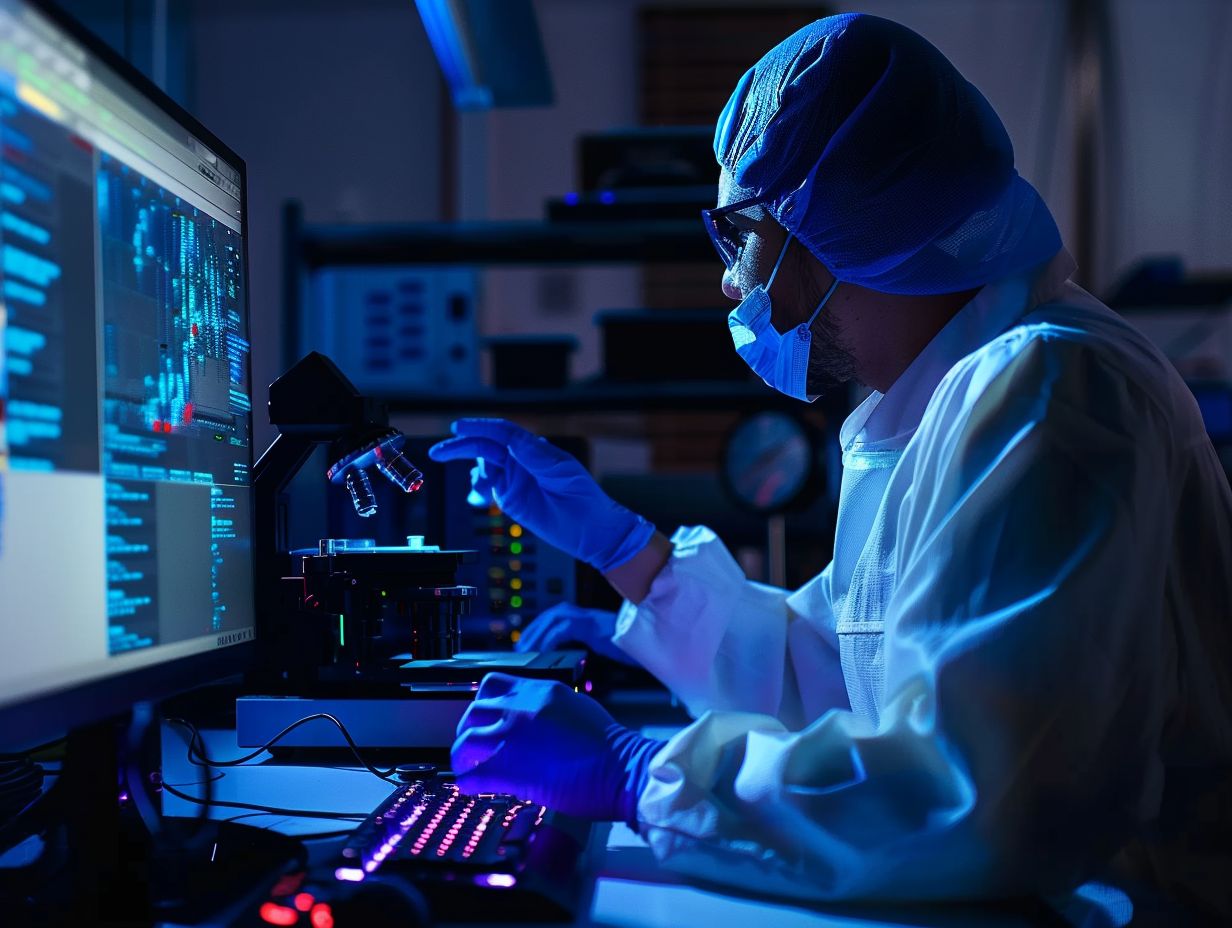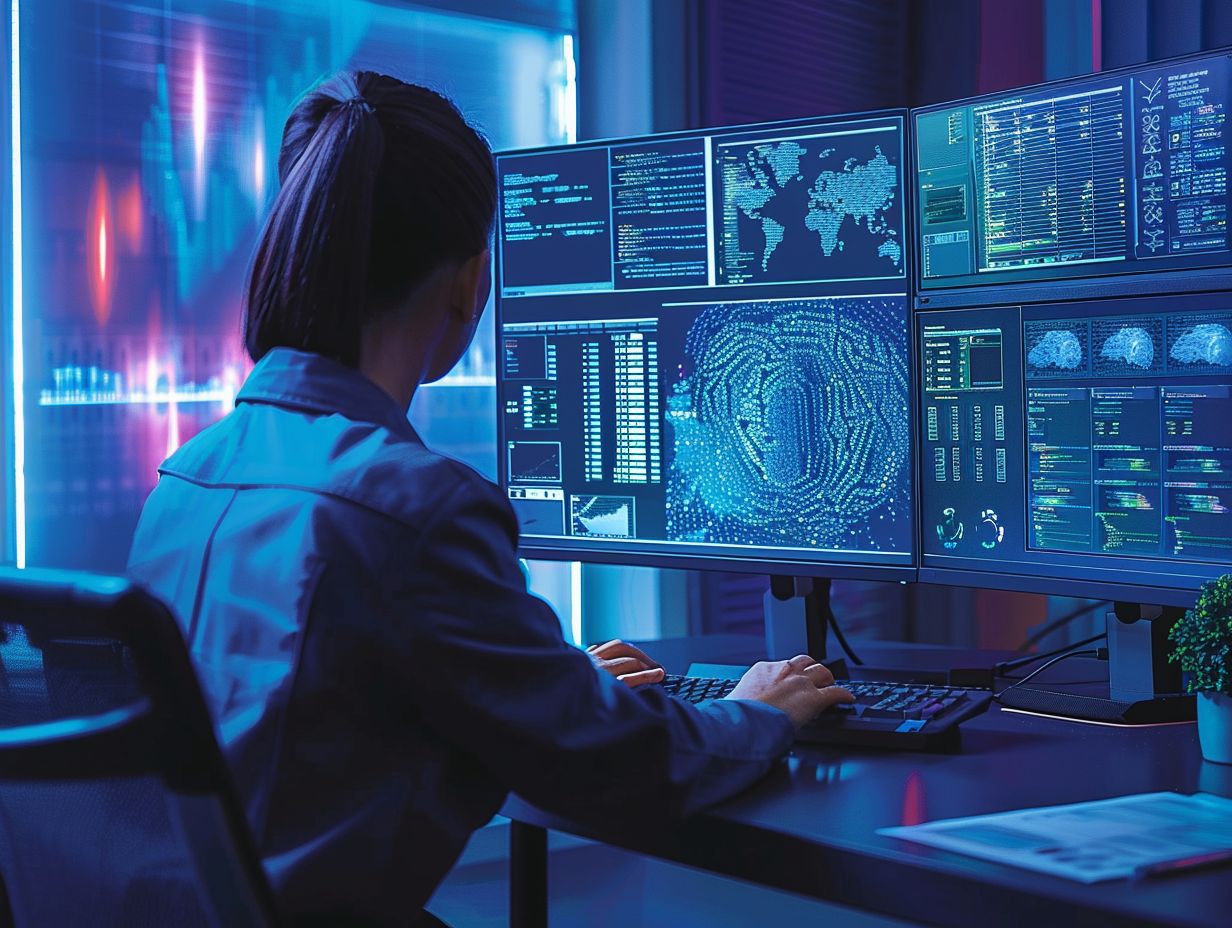Are you intrigued by the world of cybersecurity and digital investigation? Have you ever wondered what it takes to become a Computer Hacking Forensic Investigator (CHFI)? In this article, we will explore the skills and knowledge required for CHFIs, including technical and analytical abilities, legal and ethical considerations, as well as the tools and techniques used in digital forensics.
We will delve into the roles and responsibilities of a CHFI, career opportunities in the industry, and salary expectations. Join us on this journey into the fascinating world of computer hacking forensic investigation.
Key Takeaways:

What is a Computer Hacking Forensic Investigator?
A Computer Hacking Forensic Investigator (CHFI) is a professional who is trained in the detection and prevention of cybercrimes through the application of forensic investigation techniques. These individuals play a critical role in enhancing network security and supporting law enforcement agencies in addressing cyber threats.
The responsibilities of a CHFI encompass tasks such as the collection and analysis of digital evidence, performance of forensic examinations, and presentation of investigative findings in legal proceedings. CHFIs possess a high level of proficiency in utilizing a range of tools and methodologies specific to digital forensics, including data recovery, network analysis, and identification of malware. Their expertise in uncovering cybercriminal activities and safeguarding sensitive information positions them as essential assets in the constantly evolving realm of cybersecurity and defense strategies.
Skills and Knowledge Required for CHFI
To become a proficient Computer Hacking Forensic Investigator (CHFI), you must possess a diverse set of skills and knowledge. This includes expertise in utilizing forensic tools to analyze cyber threats effectively.
Technical and Analytical Abilities
You are expected to demonstrate advanced technical and analytical abilities as a CHFI in conducting cybercrime investigations, performing forensic analysis, and responding promptly and effectively to security incidents.
As a professional in this field, you must have a comprehensive understanding of various forensic analysis techniques, including computer and network forensic tools and methodologies. Your expertise should encompass deciphering complex digital evidence, reconstructing cyber incidents, and analyzing malware.
Mastery of incident response protocols is crucial for you to effectively contain security breaches, mitigate risks, and ensure seamless recovery. Your proficiency in data preservation, evidence handling, and the legal aspects of digital investigations will distinguish you as an critical asset in the realm of cybersecurity.
Legal and Ethical Considerations
Plus technical expertise, you, as a Certified Hacking Forensic Investigator (CHFI), must navigate complex legal and ethical considerations in your investigative work. Collaboration with legal professionals is essential to ensure adherence to regulations and ethical standards while combatting cybercriminal activities.
This collaboration is crucial as CHFIs play a significant role in collecting digital evidence, which must be handled meticulously to ensure admissibility in court. Upholding the integrity of the investigation process is paramount, as any misstep could jeopardize the entire case.
As a CHFI, you are tasked with the responsibility of maintaining transparency and accuracy, working within the confines of the law to gather evidence ethically. This demands a deep understanding of laws related to data privacy, search and seizure, and chain of custody to prevent any legal challenges during prosecution.
Tools and Techniques Used in CHFI

Computer Hacking Forensic Investigators (CHFIs) utilize a variety of specialized tools and techniques in digital forensics, including memory forensics, to proficiently investigate cyber incidents.
Digital Forensics Tools
You, as a Certified Hacking Forensic Investigator (CHFI), utilize cutting-edge digital forensic tools such as those provided by EC-Council to extract and analyze digital evidence effectively. These specialized tools are essential in CHFI investigations, offering advanced functionalities for data recovery, network analysis, and evidence preservation. Utilizing software like EnCase Forensic, FTK Imager, and Autopsy allows investigators to conduct in-depth examinations of devices, analyzing file systems, metadata, and communication logs to accurately reconstruct digital events.
EC-Council’s tools are tailored to meet the specific needs of forensic professionals, ensuring the integrity and authenticity of evidence, crucial for legal proceedings. By integrating these tools into your investigative workflow, you can navigate intricate digital environments with accuracy and efficiency.
Investigative Techniques
You, as a Certified Hacking Forensic Investigator (CHFI), utilize advanced investigative techniques to detect vulnerabilities, analyze security breaches, and collect evidence to support cyber investigations in various sectors, including cybersecurity and digital forensics.
As a professional in this field, you harness state-of-the-art tools such as network scanning software, memory forensics, and data recovery techniques to uncover potential threats and reconstruct the timeline of cyber incidents. By conducting meticulous examinations of digital evidence, CHFIs can reconstruct digital events, track the origin of attacks, and assess the extent of the damage caused. They implement methodologies like cross-drive analysis and volatile data collection to ensure a comprehensive understanding of network activities and potential security weaknesses.
Roles and Responsibilities of a CHFI
As a critical cybersecurity professional, you undertake essential roles such as incident response management and cyber threat analysis, contributing significantly to proactive defense measures and forensic investigations.
Key Tasks and Duties
You are entrusted with pivotal tasks such as monitoring network security, conducting forensic examinations, providing expert testimony, and collaborating with system administrators and security officers to enhance cyber defense measures.
You play a crucial role in identifying and analyzing security incidents, collecting and preserving digital evidence, and implementing strategies to prevent future cyber threats. By working closely with system administrators, you ensure that security protocols are up-to-date and that vulnerabilities are promptly addressed. Your collaboration with security officers helps in developing comprehensive cybersecurity frameworks that safeguard critical assets against potential breaches and attacks. This teamwork between CHFIs, system administrators, and security officers is essential for maintaining robust cyber defense strategies in today’s rapidly evolving threat landscape.
Career Opportunities for CHFIs

The field of Computer Hacking Forensic Investigation presents promising career opportunities with high demand in the industry and competitive salaries, appealing to professionals from various backgrounds such as legal experts, bankers, and military personnel.
Industry Demand and Job Prospects
The demand for Certified Hacking Forensic Investigators (CHFIs) continues to increase steadily in various industries. Organizations are prioritizing cybersecurity measures and are actively seeking skilled professionals to address evolving cyber threats and safeguard critical information assets.
The importance of Certified Hacking Forensic Investigators (CHFIs) has become more evident as technology advancements accelerate. CHFIs play a critical role in detecting and responding to cyber incidents, conducting forensic analysis, and ensuring data integrity. The field of information security is experiencing rapid growth, providing CHFIs with a wide array of career opportunities in both public and private sectors. Given the growing importance of cybersecurity roles, the demand for CHFIs is projected to rise even further in the job market.
Salary Expectations
You can expect competitive salaries as a CHFI, aligned with your expertise and experience. There are opportunities for career growth and added incentives for continuing education and specialized knowledge, particularly in areas like dark web investigations.
Possessing specialized skills in emerging fields such as dark web investigations can significantly increase your value to organizations, resulting in higher earning prospects. It’s essential to stay informed about the latest techniques and tools in digital forensics to remain competitive and command premium compensation. Employers understand the significance of investing in ongoing education for CHFIs to ensure they possess the most current skills and knowledge to combat evolving cyber threats. This focus on continual learning creates pathways for professionals to advance in their careers and boost their earning potential.
Frequently Asked Questions
What is a Computer Hacking Forensic Investigator (CHFI)?
A Computer Hacking Forensic Investigator (CHFI) is a trained professional who specializes in identifying and collecting evidence from digital devices in order to investigate cybercrimes.
What are the primary responsibilities of a Computer Hacking Forensic Investigator (CHFI)?

A CHFI’s primary responsibilities include conducting digital forensic investigations, analyzing and preserving evidence, and providing expert testimony in legal proceedings.
What is the process of becoming a Certified Computer Hacking Forensic Investigator (CHFI)?
To become a CHFI, one must first complete a training course and pass a certification exam. They must also have a minimum of 2 years of experience in the field of digital forensics.
What types of cases does a Computer Hacking Forensic Investigator (CHFI) handle?
A CHFI can handle a wide range of cases, including cybercrimes, data breaches, intellectual property theft, and employee misconduct investigations.
What are the key skills and qualifications needed to become a successful Computer Hacking Forensic Investigator (CHFI)?
A CHFI must have strong technical skills, knowledge of forensic tools and techniques, attention to detail, and the ability to handle sensitive and confidential information.
What are the ethical considerations of working as a Computer Hacking Forensic Investigator (CHFI)?
A CHFI must adhere to ethical guidelines and laws when handling evidence and conducting investigations. They must also respect the privacy of individuals and protect sensitive information obtained during their work.
